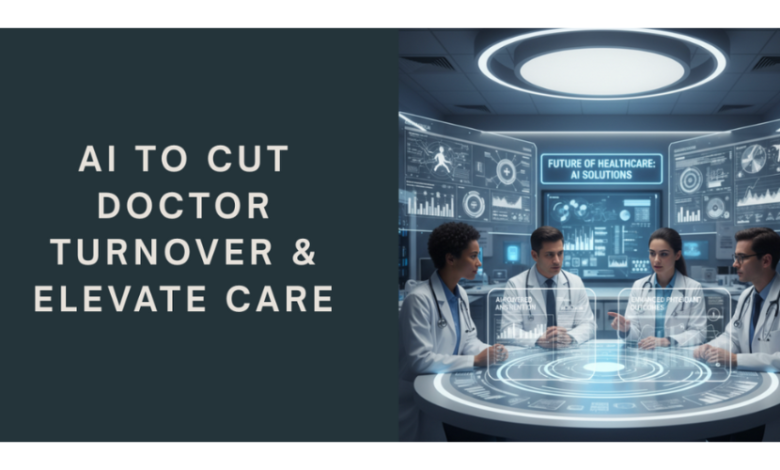
Global healthcare systems are facing several difficulties, from ineffective patient care to high physician turnover. These issues have the potential to seriously impair the standard of care given as the demand for medical services rises. The application of artificial intelligence (AI) in healthcare environments is one viable remedy. The data processing, pattern recognition, and decision support capabilities of AI can improve patient outcomes by addressing problems like high physician turnover and increasing operational efficiency.
Doctor turnover is just one of the big problems that have a global negative impact on the healthcare sector. One of the highest turnover rates hits the healthcare industry, where doctors, nurses, and other medical personnel tired of their stressful work routine, burnout, absence of work-life balance, and low salaries leave their posts quite often.
AI as a Solution to Doctor Turnover:
- Automating Routine Tasks
The heavy administrative workload is among the leading reasons for physician burnout, which often leads a diversion from patient care. AI-powered technologies offer means to reduce this burden. One can considerably reduce documentation time by employing Natural Language Processing (NLP) for writing reports, interpreting medical data, and recording patient notes. In a similar manner, the monotonous processes like data entry, insurance claims management, and appointment scheduling have been made efficient with the help of RPA or robotic process automation. AI facilitates the completion of tasks to the maximum capacity, lowers the level of stress, and makes the healthcare system efficient by the use of AI technology which therefore, allows doctors to engage more in direct patient care.
- Enhancing Decision-Making with AI-Driven Insights
One of the leading ways AI algorithms have become pivotal tools in the modern healthcare sector is the use of machine learning to substantially facilitate clinical decision-making through the processing of vast amounts of patient data. To give examples, AI uses EHRs and real-time patient data to support physicians in diagnosing, recommending treatments, and forecasting outcomes. Appropriate intervention will be possible if predictive analytics foresee decline or complications in the patient. Clinical Decision Support System (CDSS) can always bring to the fore the evidences that support the recommendations and also the risks or errors that may be there. AI by providing these insights to the doctors, reduces their cognitive load, thus they can concentrate on the crucial patient care and also have less stress which is a major cause of burnout.
- AI-Powered Telemedicine Solutions
AI-powered telemedicine has expanded exponentially, notably after the COVID-19 outbreak, and it has been a key factor in supporting doctors in the remote and understaffed hospitals. By utilizing chatbots and virtual assistants, AI-enabled virtual consultations offer basic patient assessments, symptom-based guidance, and case triage, thus, allowing physicians to focus on the most critical cases.
Besides that, AI-fused remote monitoring instruments provide a hassle-free method of continuous surveillance of patient vitals, trend identification, and immediate actions eliminating the necessity of frequent visits. AI has the capability to greatly improve patient care and healthcare accessibility. Such a step could reduce the doctor’s workload drastically, therefore, the possibility of burnout would be reduced as well as their working capacity increased, thus the doctors work-life balance being affected in a positive way.
The AI’s Role in Improving Healthcare Outcomes
- Personalized Treatment Plans
Powering healthcare professionals with AI, they are enabled to create the most effective treatment plan for the patient by considering various data sources including health history, living habits, and heredity. AI through precision medicine genetic data helps to predict patient reaction to a particular treatment thereby ruling out the need of trying out different treatments. Management of chronic diseases is done through AI which is always monitoring patient data and offering treatment adjustment recommendations quickly in cases like diabetes or hypertension. Through treatment personalization to meet the needs of each patient, AI enhances patient health, elevates the treatment quality, and makes the physicians job easier and more efficient, thereby resulting in the provision of more preventive, quick, and targeted care.
- Reducing Medical Errors
One of the most significant risk factors for the healthcare sector are medical errors, which often result in negative patient outcomes. AI achieves the reduction of these errors through the identification of potential hazards and providing on-time decision support. The use of AI in diagnostics has led to phenomenal precision in various areas of medicine, radiology, pathology, and dermatology, thus, it can detect the occurrences of abnormalities that human doctors may not have noticed. Additionally, AI works to make drug use safer by cross-checking the prescriptions with a patient’s allergies, medical history, and pre-existing drugs. AI, without doubt, plays a vital role in the elimination of medical errors, and the patient outcome enhancement through increasing the safety of treatment and diagnostic accuracy.
- Streamlining Hospital Operations
AI improves patient flow and resource management, which benefits hospital operations. It is possible for hospitals to manage resources efficiently and enhance the scheduling of staff by implementing machine learning algorithms that have the capability to predict admissions and discharges. AI predicts peak patient loads using predictive scheduling, reducing understaffing and guaranteeing sufficient coverage. By allocating ICU beds, equipment, and staff where they are most required depending on demand in real time, AI also facilitates optimal resource allocation. These efficiencies boost overall hospital efficiency, guarantee prompt treatment delivery, and enhance patient outcomes.
AI in Healthcare Market:
The global AI in healthcare market is growing quickly because to developments in AI technologies that are changing many aspects of healthcare delivery, including robots, multimodal large language models, and generative AI. AI is improving the efficiency and accuracy of illness identification in clinical diagnostics. According to Pristine Market Insights, artificial intelligence (AI) offers a revolutionary answer to the complicated problems of physician churn and subpar healthcare results.
AI can lessen the workload for physicians and eventually improve patient care by automating administrative duties, simplifying hospital operations, boosting decision-making, and promoting work-life balance. Integrating AI into the system is a major move that will lead to the solution of doctor turnover, be the system more productive, and improve healthcare delivery in general, although it won’t be able to solve all healthcare problems by itself. As the AI technology continues to evolve, it can make health care a lot better which is good news not only for patients but also for healthcare teams.


